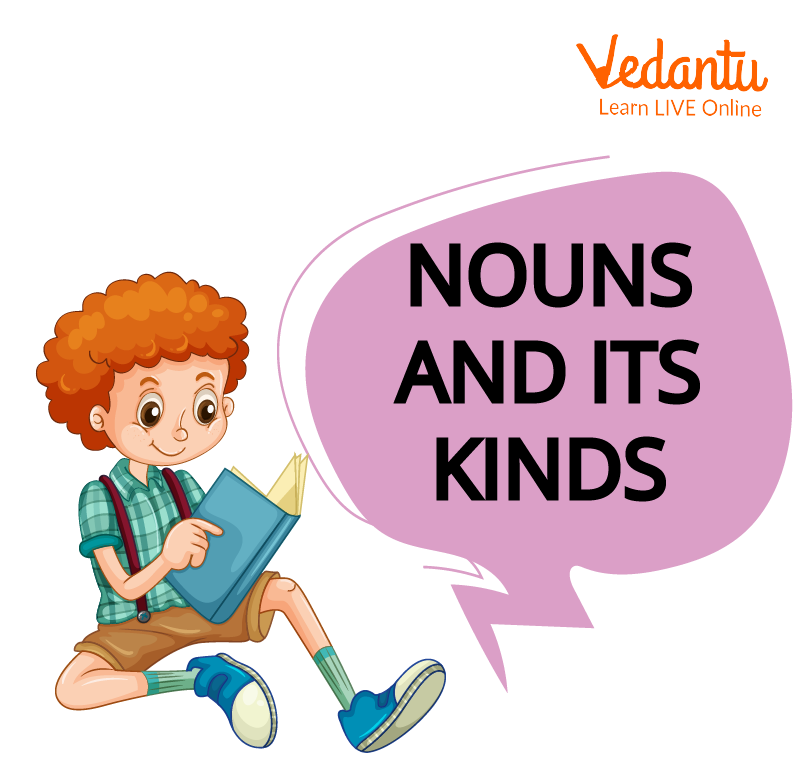In today’s lesson, we will discuss noun and their types. We will begin with the understanding of nouns. Then we will see examples of the noun. A noun in simple terms is a naming word. Moving ahead we will learn about different types of nouns. Practice questions and solved examples are given throughout the article for better understanding and concept clarity. Let’s begin the journey on this amazing topic.

English
What is a Noun?
A noun is a term that designates a certain person, place, object, or notion. Man, Ram, India, table, and car are a few examples.

Introduction to Noun
Types of Nouns

Types of Noun
Noun can be divided into five following groups:-
1. Common noun
2. Proper noun
3. Abstract noun
4. Collective noun
5. Material noun
1. Common Noun
A common noun is a name used to refer to any individual, location, or object generally.
For example, the term "boy" can be applied to any boy (Rakesh, Raju, Amit, Rajesh, Mayank, etc.), but it does not specifically reference any one boy in particular. As a result, the noun "boy" is widely used.
Similarly, the name ‘city’ refers to any city in the world (Delhi, Patna, Lucknow, etc.) but does not mention any particular city. Thus, ‘city’ is a common noun.
Example, I really love this city.
She is my favourite professor.
I will go to the temple tomorrow after a walk in the garden.
2. Proper Noun
Proper nouns are names given to specific people, places, or things.
For example,
Rakesh and Amit are the names of two boys.
Delhi is a city.
Taj Mahal is a building.
Ganga is a river.
Mt. Everest is a mountain range.
I don’t want to miss the Wimbledon series.
I would like to go to Sydney in December.
Rakesh, Mayank, Delhi, the Taj Mahal, the Ganges, Sydney, December, Wimbledon and Mount Everest are all proper nouns.
Note: A proper noun's first letter is usually capitalised. |
3. Abstract Noun
Abstract noun is the name of anything we can think about rather than something we can see or touch.
They are names for certain traits, emotions, states, or behaviour.
For example, charity is the term for a trait that cannot be seen but can only be understood by observing certain actions or a person's behavioural pattern, it is an abstract noun.
Formation of Abstract Nouns
Adjectives, verbs, and ordinary nouns can all be used to create abstract nouns.
For example,
Word | Abstract noun |
cruel | cruelty |
honest | honesty |
brave | bravery |
By the addition of ness to the given word
Word | Abstract noun |
good | goodness |
calm | calmness |
foolish | foolishness |
great | greatness |
bright | brightness |
Addition of ‘ce’ replacing ‘t’
Word | Abstract noun |
intelligent | intelligence |
brilliant | brilliance |
obedient | obedience |
Addition of ‘th’ and change in Vowels
Word | Abstract noun |
strong | strength |
long | length |
high | height |
broad | breadth |
deep | depth |
true | truth |
Deletion of ‘y’
Word | Abstract noun |
Easy | ease |
worthy | worth |
greedy | greed |
Examples:
I am not interested in the gossip.
You are worthy of all the success and love.
His brilliance is truly unmatched.
Goodness radiates positivity and light.
My mother does everything with great ease.
Note: Abstract nouns also include the names of the arts and sciences, grammar, physics, music, pottery, etc. |
4. Collective Noun
A collective noun is a term used to refer to a group of people, animals, or things viewed as a whole.
For example, a bouquet of flowers, a band of musicians, or a heap of sand.
Our team won the dance competition.
The little boy was scared and amused by an army of ants.
Please pass me the bunch of keys.
Society can never be pleased.
5. Material Noun
Substances or materials are referred to as material nouns.
For instance, material nouns include gold, iron, and steel.
This is a glass cup.
I am not fond of wheat products.
He has a silver allergy.
Difficult Word Meanings
Word | Definition |
Noun | A noun is a term that designates a certain person, place, object, or notion |
Abstract noun | Abstract noun is the name of anything we can think about rather than something we can see or touch |
Material noun | Substances or materials are referred to as material nouns |
Practice Questions
A. Identify the type of noun for each of the following.
Crowd
Goodness
Slavery
Honesty
Germany
Dentist
B. Complete these sentences using suitable collective nouns.
A _____ of keys.
A _____ of paper.
A _____ of sticks.
A _____ of fruits.
A _____ of bees.
C. Underline the nouns in the given sentences.
Riya is a good girl.
We saw tigers in the zoo
The teacher writes on the board.
Ram reads a book.
I like mango juice.
Answers:
Identify the type of noun for each of the following.
The word crowd is a type of collective noun.
The word goodness is a type of abstract noun.
The word slavery is a type of abstract noun.
The word honesty is a type of abstract noun.
The word Germany is a type of proper noun.
The word dentist is a type of common noun.
B. Complete these sentences using suitable collective nouns.
A bunch of keys.
A ream of paper.
A bundle of sticks.
A basket of fruits.
A hive of bees.
C. Identify the nouns in the given sentences.
Riya is a good girl.
We saw tigers in the zoo.
The teacher writes on the board.
Ram reads a book.
I like mango juice.
Benefits of Learning Nouns and Its Kinds for Class 5
Learning various nouns is very important if you want to learn English. Nouns are the most important part of the sentence, and almost every sentence in English has one or more than one nouns in it.
Along with verbs and pronouns, nouns are the basic parts of speech that can act as a subject or an object in a sentence.
For example, Harry is sleeping; I like to eat chocolate. In the first sentence, the word ‘Harry’ is a noun and the subject of the sentence; in the second sentence, the word ‘chocolate’ is a noun and the object of the sentence.
Examples of the Noun and Its Kinds for Class 5
Rahim is singing. (Rahim: proper noun)
The dress is made of cotton. (Dress: common noun, Cotton: material noun)
I love my friends. (Love: abstract nouns, friends: common noun)
She gave me a jar of honey. (Jar: collective noun, Honey: proper noun)
Interesting Facts About Nouns
There are many interesting facts about nouns:
The proper nouns always start with a capital letter. (Example: Delhi, India, Ron)
Nouns are generally placed in a sentence after words like ‘a’, ‘an’, ‘some’, or ‘the’.
The word ‘noun’ is itself a noun. Isn’t it funny??
Noun Chart for Class 5
Proper Noun | Common Noun | Collective Noun | Abstract Noun | Material Noun |
Aditya | Girl | A packet of chocolates | Hate | Iron |
London | Friend | A bowl of fruits | Like | Silver |
Ganges | Country | A circle of friends | Sad | Plastic |
Sunday | Boy | A troop of soldiers | Honesty | Wood |
America | Game | A bundle of note | Courage | Air |
John | Subject | A team of players. | Freedom | Water |
Important Topics of the Noun for Class 5
In the Class 5 English Grammar syllabus, you will learn nouns. The important topics of this chapter are as follows:
What is the noun for Class 5?
What are the different types of nouns?
Identify each type of noun.
Make sentences for each type of noun.
Class 5 English the Noun and Its Kinds Free PDF Download
You can download the noun and its kinds for Class 5 PDF for students; it will provide them a detailed concept of the topic.
The noun exercise for Class 5 with answers includes additional questions and customised worksheets to help students practise the topic for their exam.
Vedantu’s experts will provide the online classes on the noun for Class 5. Students of Class 5 can check the online English grammar classes from Vedantu’s website. We hope the kids will benefit from attending these classes.
Summary
At first appearance, the noun definition is simple: they are name words that refer to a person, place, thing, or idea. They're undoubtedly the most significant part of any phrase because they're usually the subject. They can also be the sentence's immediate object. A noun is a person's, place's, or thing's name. The term "thing" refers to objects that we can see, touch, taste, feel, and hear. It also includes things that we can only think about but neither see nor touch. There are different types of noun based on which category the naming words fall into.
